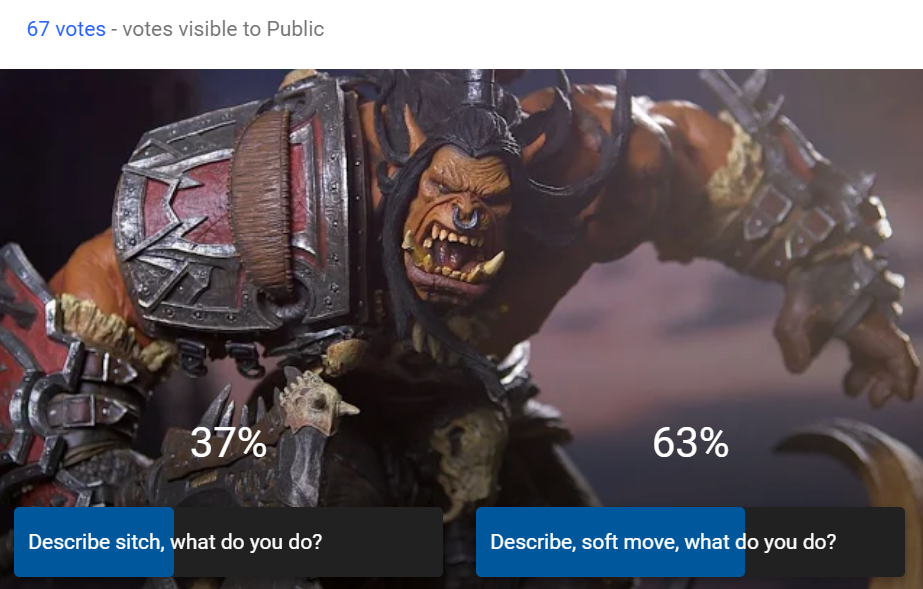The Thief, the Paladin, and the Cleric have followed the orcs’ bloody trail down the dirt-packed tunnel and into an old cellar. It’s dusty and cluttered, but the tracks end at the far wall, going right through it. Obviously it’s a secret door.
They spread out, looking for a way to open it. The paladin Discerns Realities, but even with the Cleric’s Aid, it’s a miss.
I put them in a spot and as they search, the door opens from the other side. Two orcs stand in the doorway. One blinks. The other snarls and draws his cleaver. What do you all do?
The Cleric starts casting magic weapon. The Thief draws his rapier. The Paladin’s polearm is leaning against the wall, and the quarters are too tight to use it, so he slams the door shut on the orcs.
I have the Cleric and the Paladin roll at the same time (Cast a Spell and Defy Danger with STR or INT, his choice). They both get a 7-9. The cleric chooses to draw unwelcome attention, and that lends nicely to a “worse outcome” on the Paladin’s Defy Danger…
“Paladin, you slam the door on the arm of the one who was blinking, cutting him off, but not before the other orcs spies you, Cleric, and barrels into the room growling “CASTER!” and swings his cleaver at your head, what do you do?”
The Thief interjects: “I lunge at him and stab him! Backstab?” No, not a backstab; the orc is hardly surprised or defenseless. It’s just a Hack and Slash, you still want to do it? “Sure!” Rolls. 7-9.
“Okay, deal your damage. How much? Only 2, huh? Well, it’s still up, and I think it checks it charge and twists back, your blades slices across its ribs.”
Then, for it’s attack, I choose to hurt them (the orc bloodwarrior does messy damage after all) and say “But as you spring back from your lunge it lashes out and just CHOPS into your forward leg, right above the knee and there’s a spray of blood. Take d6+2 damage and your knee buckles under you, not bearing your weight.” The Thief takes like 5 damage, ouch, but he’s got like 13 left so whatever.
You’re the GM. You turn the spotlight back to the Cleric. What do you do?
Option A: Cleric, you see this happen: the lunge, the chop, the spray of blood. The Paladin’s leaning against the door with the other orc’s arm sticking out. What do you do?”
Option B: Cleric, you see this happen: the lunge, the chop, the spray of blood. The Paladin’s leaning against the door with the other orc’s arm sticking out. This orc, though, doesn’t even slow down, it presses the attack on the Thief, stepping in going after him with the back-swing, and you can see the Thief stumble. What do you do?”


I love option B and I am working to do it more.
Definitely option B: its a charged situation for the player to jump into whereas A has a strange lull which drops momentum
I love the idea of making a soft move everytime you move the spotlight. Makes the scene definately more dynamic. And it doesn’t feel like cheating because “Everyone looks at you” plus you’re doing a pretty soft move. You’re not really changing the situation with the thief : he H&S, damaged the orc, the orc damaged him back, it’s just the narrative reemphasizing on the immediate danger. You’re probably not going to make a hard move on the thief if the cleric decides not to help him out. You’re probably going to give the spotlight back to the theif and give him a chance to do something before getting smacked again.
Always push a move. Keep the action moving, raise the stakes, fuel the conflict.
B seems more exciting to me.
Option B feels more in the spirit of how I understand Dungeon World (and PBTA generally). Option A feels a little more D&D-like, where each character gets a turn to try something in a freeze-framed static situation.
I also just think it makes your job as GM a lot easier if you’ve already clearly established the stakes and threats – it makes those partial successes and misses much easier to adjudicate. You’re just following through.
I go for A since B only states what was said before.
Weeell, if it is a soft move, it opens the way for a hard move, it kind of imposes to the Cleric’s player what they should do, or suffer the consequences. Of course, the situation isn’t neutral, there’s already some pressure,. But, to me, recapping the situation leaves more options and agency to the player. Not that it will sound much different, but what will follow after that will.
I to hope to aspire to use option B) more often, but would probably use option A).
Brewity has it’s own merit in fight scenes though.